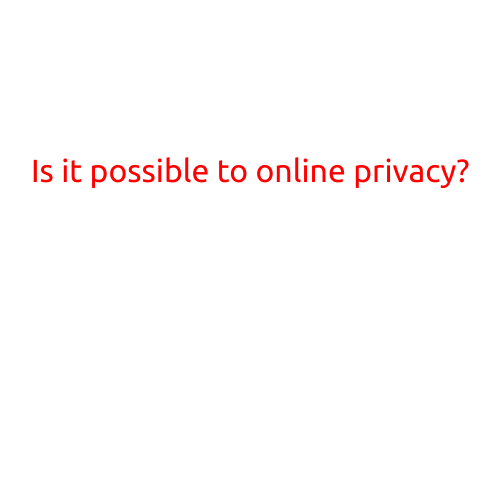
Is it Possible to Achieve Online Privacy?
In today’s digital age, online privacy has become a pressing concern. With the advent of social media, online shopping, and data-driven advertising, our personal information is being collected and shared more than ever before. However, with the constant threat of cyberattacks, data breaches, and surveillance, many people are left wondering: is it possible to achieve online privacy?
The Reality of Online Tracking
Unfortunately, the answer is no. It’s not possible to completely eliminate online tracking. The moment you access the internet, you’re tracked. Your IP address, browser history, search queries, and even your physical location are all potential targets for tracking and data collection. This information is sold to advertisers, marketed, and used to shape our online experience.
How Does Online Tracking Work?
Online tracking is a complex process that relies on various techniques, including:
- Cookies: Small pieces of data stored on your device by websites and third-party advertisers to track your browsing behavior.
- Device fingerprinting: Collecting detailed information about your device, such as its operating system, browser type, and screen resolution, to uniquely identify you.
- Fingerprinting: Analyzing your browser’s behavior, such as your typing speed and mouse movements, to create a unique profile.
- Malware: Installing malicious software on your device to collect sensitive information without your consent.
The Risks of Online Tracking
The consequences of online tracking are far-reaching and can have serious implications for our privacy and security. Some of the risks include:
- Data breaches: The potential for sensitive information to fall into the wrong hands.
- Surveillance: Governments, advertisers, and other organizations using your data to monitor your activities.
- Targeted advertising: Feeling like you’re being followed online, with ads tailored to your browsing habits.
- Identity theft: Criminals using your data to impersonate you online.
The Quest for Online Privacy
So, if complete online privacy is impossible, what can we do to protect ourselves? Here are a few strategies to consider:
- Use a VPN: Virtual Private Networks (VPNs) can mask your IP address and encrypt your internet traffic.
- Disable cookies: Clearing cookies regularly and opting out of third-party tracking can reduce the amount of data collected.
- Use private browsing modes: Internet browsers’ private modes can limit data collection and tracking.
- Regulate your online behavior: Being mindful of your online activities and limiting your exposure to tracking can help maintain your privacy.
Conclusion
While achieving complete online privacy may be impossible, taking precautions and being aware of the risks can help minimize the threat. By using technology to protect our privacy and being mindful of our online behavior, we can reduce the likelihood of data breaches and surveillance. It’s essential to remember that online privacy is a shared responsibility, and by working together, we can create a safer and more secure online environment.
Final Thoughts
As the digital landscape continues to evolve, it’s crucial to stay informed and proactive in protecting our online privacy. Remember, even with the best security measures in place, there’s always a degree of risk involved with online activity. By taking the necessary steps to secure our digital lives, we can reduce the likelihood of online privacy violations and maintain our anonymity online.





